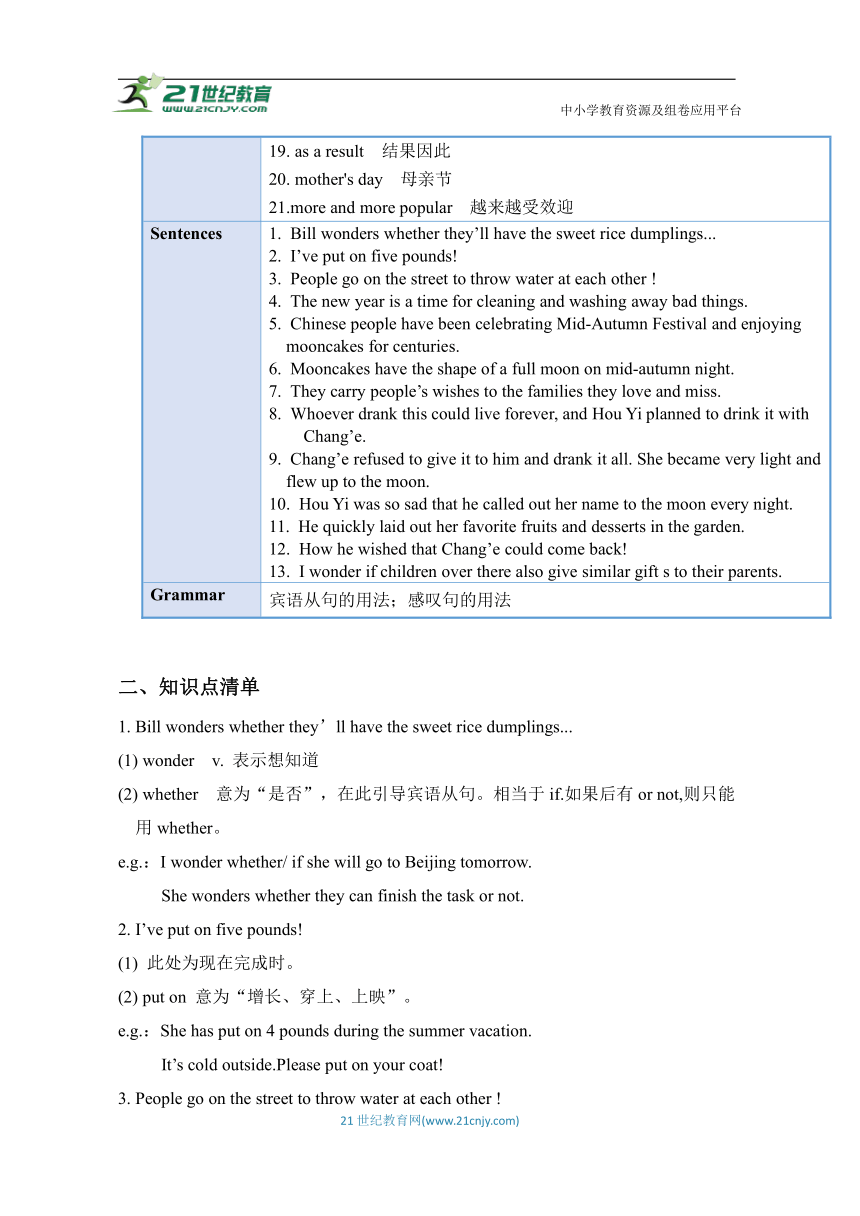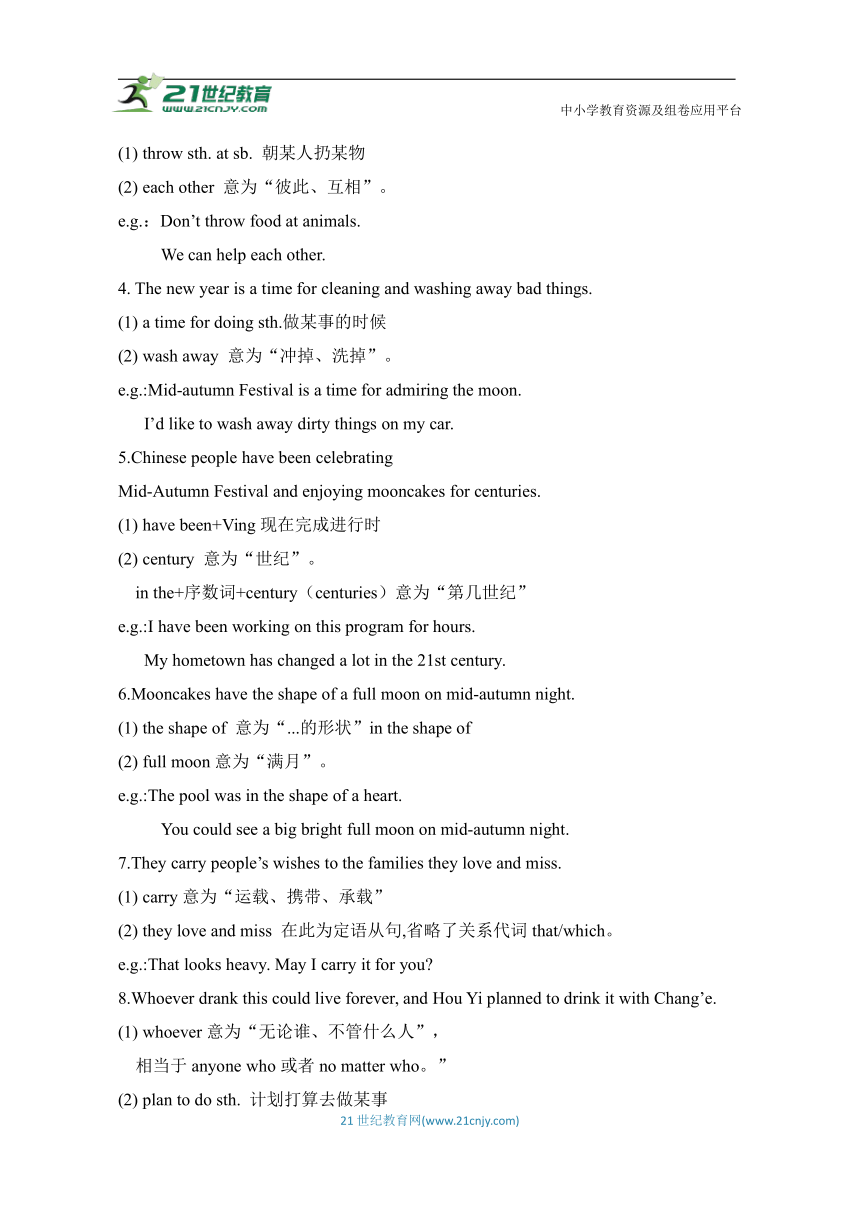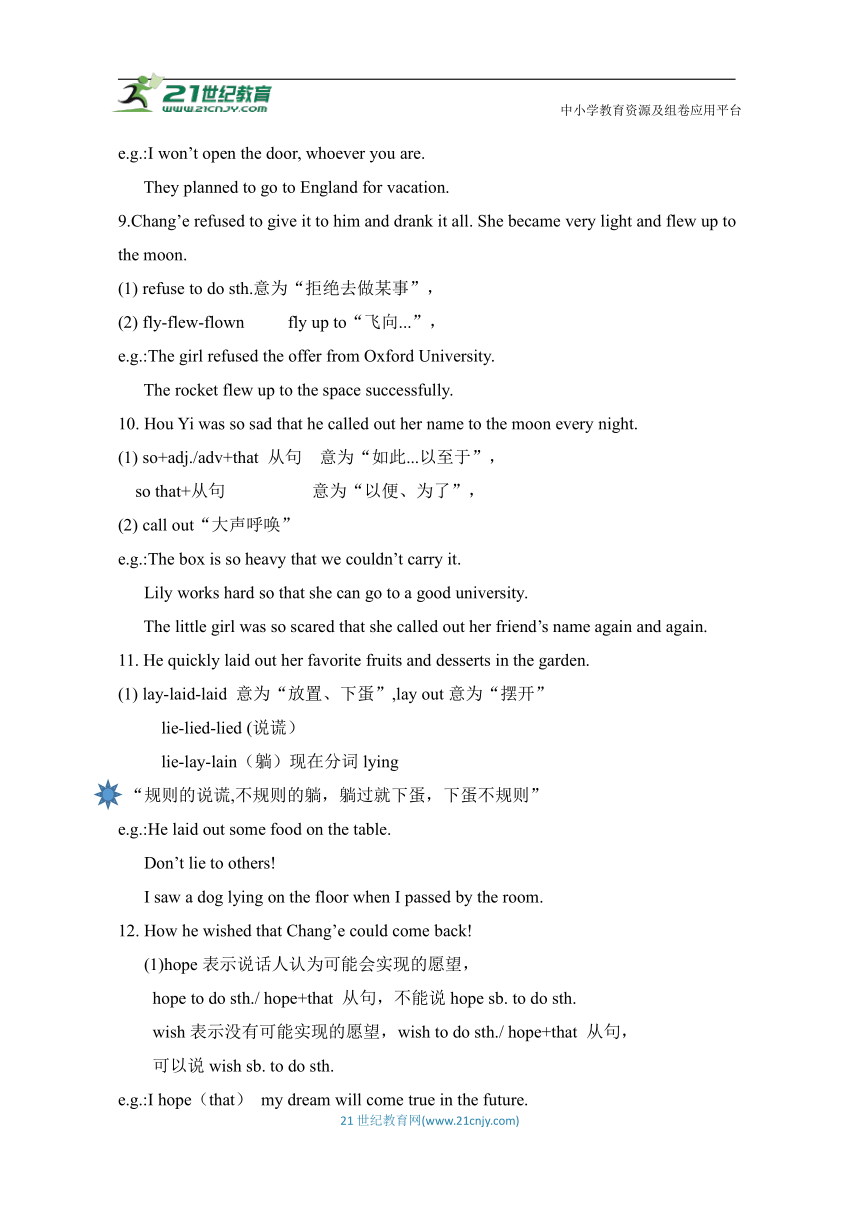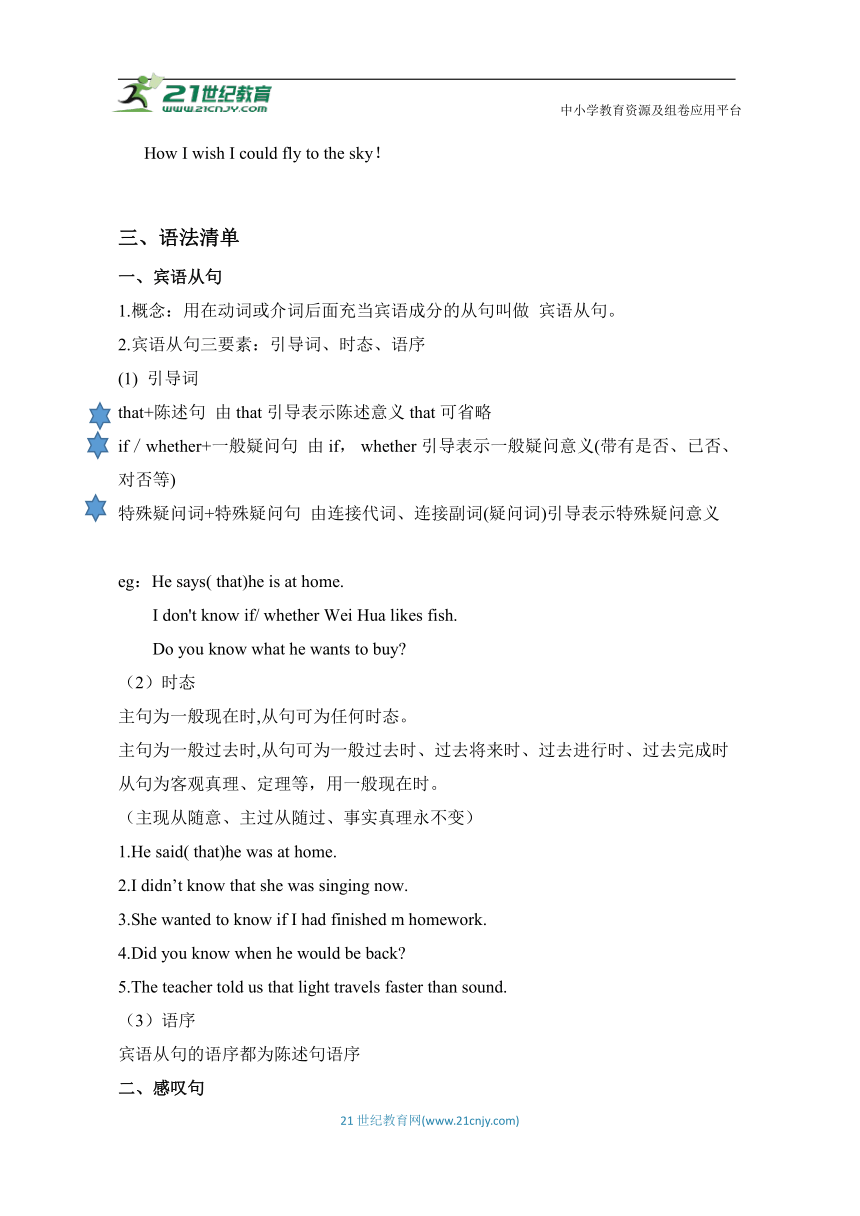Unit 2 I think that mooncakes are delicious. 单元知识清单(基础+知识点+语法)
文档属性
| 名称 | Unit 2 I think that mooncakes are delicious. 单元知识清单(基础+知识点+语法) |

|
|
| 格式 | docx | ||
| 文件大小 | 81.6KB | ||
| 资源类型 | 试卷 | ||
| 版本资源 | 人教新目标(Go for it)版 | ||
| 科目 | 英语 | ||
| 更新时间 | 2023-10-10 00:00:00 | ||
图片预览





文档简介
中小学教育资源及组卷应用平台
Unit 2 I think that mooncakes are delicious单元知识清单
Section A
一、基础知识清单
Words l.lantern.灯笼 2.stranger n.陌生人 strange adj. 陌生人 3.relative n. 亲戚 4.pound n.英镑 5.folk adj.民间的;民俗的 6.goddess n. 女神 7.steal v. 偷;窃取 stole-stolen 8.lay v.放置;安放;产(卵);下(蛋)laid-laid 9.desert n.甜点 10.garden n.花园 11.admire v.欣赏 12.tie n.领带 v.捆;束
Phrases 1. put on 增加(体重)发胖 2.care about 关心在乎
3. end up 最终成为,最后处于 4. not...only..but also...不但-而且 5. shoot down 射下 6. used to do 过去常常做
7. remind sb.of 使某人想起 8. give out 分发.发放
9.the water festival 泼水节 10.the Chinese spring festival 中国春节
11 next year 明年 12. sound like 听起来像
13. each other 互相彼此 14. in the shape of 像...的形状
15.on Mid- autumn night 在中秋之夜 16 fly up to飞向 lay out 摆开布置 come back 回来
19. as a result 结果因此 20. mother's day 母亲节
21.more and more popular 越来越受效迎
Sentences Bill wonders whether they’ll have the sweet rice dumplings... I’ve put on five pounds! People go on the street to throw water at each other ! The new year is a time for cleaning and washing away bad things. Chinese people have been celebrating Mid-Autumn Festival and enjoying mooncakes for centuries. Mooncakes have the shape of a full moon on mid-autumn night. They carry people’s wishes to the families they love and miss. Whoever drank this could live forever, and Hou Yi planned to drink it with Chang’e. Chang’e refused to give it to him and drank it all. She became very light and flew up to the moon. Hou Yi was so sad that he called out her name to the moon every night. He quickly laid out her favorite fruits and desserts in the garden. How he wished that Chang’e could come back! I wonder if children over there also give similar gift s to their parents.
Grammar 宾语从句的用法;感叹句的用法
二、知识点清单
1. Bill wonders whether they’ll have the sweet rice dumplings...
(1) wonder v. 表示想知道
(2) whether 意为“是否”,在此引导宾语从句。相当于if.如果后有or not,则只能用whether。
e.g.:I wonder whether/ if she will go to Beijing tomorrow.
She wonders whether they can finish the task or not.
2. I’ve put on five pounds!
(1) 此处为现在完成时。
(2) put on 意为“增长、穿上、上映”。
e.g.:She has put on 4 pounds during the summer vacation.
It’s cold outside.Please put on your coat!
3. People go on the street to throw water at each other !
(1) throw sth. at sb. 朝某人扔某物
(2) each other 意为“彼此、互相”。
e.g.:Don’t throw food at animals.
We can help each other.
4. The new year is a time for cleaning and washing away bad things.
(1) a time for doing sth.做某事的时候
(2) wash away 意为“冲掉、洗掉”。
e.g.:Mid-autumn Festival is a time for admiring the moon.
I’d like to wash away dirty things on my car.
5.Chinese people have been celebrating
Mid-Autumn Festival and enjoying mooncakes for centuries.
(1) have been+Ving现在完成进行时
(2) century 意为“世纪”。
in the+序数词+century(centuries)意为“第几世纪”
e.g.:I have been working on this program for hours.
My hometown has changed a lot in the 21st century.
6.Mooncakes have the shape of a full moon on mid-autumn night.
(1) the shape of 意为“...的形状”in the shape of
(2) full moon意为“满月”。
e.g.:The pool was in the shape of a heart.
You could see a big bright full moon on mid-autumn night.
7.They carry people’s wishes to the families they love and miss.
(1) carry意为“运载、携带、承载”
(2) they love and miss 在此为定语从句,省略了关系代词that/which。
e.g.:That looks heavy. May I carry it for you
8.Whoever drank this could live forever, and Hou Yi planned to drink it with Chang’e.
(1) whoever意为“无论谁、不管什么人”,
相当于anyone who或者no matter who。”
(2) plan to do sth. 计划打算去做某事
e.g.:I won’t open the door, whoever you are.
They planned to go to England for vacation.
9.Chang’e refused to give it to him and drank it all. She became very light and flew up to the moon.
(1) refuse to do sth.意为“拒绝去做某事”,
(2) fly-flew-flown fly up to“飞向...”,
e.g.:The girl refused the offer from Oxford University.
The rocket flew up to the space successfully.
10. Hou Yi was so sad that he called out her name to the moon every night.
(1) so+adj./adv+that 从句 意为“如此...以至于”,
so that+从句 意为“以便、为了”,
(2) call out“大声呼唤”
e.g.:The box is so heavy that we couldn’t carry it.
Lily works hard so that she can go to a good university.
The little girl was so scared that she called out her friend’s name again and again.
11. He quickly laid out her favorite fruits and desserts in the garden.
(1) lay-laid-laid 意为“放置、下蛋”,lay out意为“摆开”
lie-lied-lied (说谎)
lie-lay-lain(躺)现在分词lying
“规则的说谎,不规则的躺,躺过就下蛋,下蛋不规则”
e.g.:He laid out some food on the table.
Don’t lie to others!
I saw a dog lying on the floor when I passed by the room.
12. How he wished that Chang’e could come back!
(1)hope表示说话人认为可能会实现的愿望,
hope to do sth./ hope+that 从句,不能说hope sb. to do sth.
wish表示没有可能实现的愿望,wish to do sth./ hope+that 从句,
可以说wish sb. to do sth.
e.g.:I hope(that) my dream will come true in the future.
How I wish I could fly to the sky!
三、语法清单
一、宾语从句
1.概念:用在动词或介词后面充当宾语成分的从句叫做 宾语从句。
2.宾语从句三要素:引导词、时态、语序
(1) 引导词
that+陈述句 由that引导表示陈述意义that可省略
if/whether+一般疑问句 由if, whether引导表示一般疑问意义(带有是否、已否、对否等)
特殊疑问词+特殊疑问句 由连接代词、连接副词(疑问词)引导表示特殊疑问意义
eg:He says( that)he is at home.
I don't know if/ whether Wei Hua likes fish.
Do you know what he wants to buy
(2)时态
主句为一般现在时,从句可为任何时态。
主句为一般过去时,从句可为一般过去时、过去将来时、过去进行时、过去完成时
从句为客观真理、定理等,用一般现在时。
(主现从随意、主过从随过、事实真理永不变)
1.He said( that)he was at home.
2.I didn’t know that she was singing now.
3.She wanted to know if I had finished m homework.
4.Did you know when he would be back
5.The teacher told us that light travels faster than sound.
(3)语序
宾语从句的语序都为陈述句语序
二、感叹句
1.概念:感叹句是表达喜、怒、哀、乐以及惊奇、惊讶等强烈感情的句子。感叹句通常由what或how引导。
2.由what引导的感叹句,其句子结构可分为以下三种:
(1)“What+a/an+ 形容词+可数名词单数(主语+谓语+其他)!”。
What a nice present it is! 它是一件多么好的礼物啊!
What an interesting book it is! 它是一本多么有趣的书啊!
可用句型:“What+ 形容词+可数各词复数(+主语十谓语+其他)!如
What beautiful flowers they are多么漂亮的花啊!
What good children they are!他们是多么好的孩子啊!
(3)可用句型:“What +形容词+不可数名词(+主语十谓语+其他)!”如
What fine weather it is today! 今天天气多好啊!
What important news it is! 多重要的新闻啊!
3.由how引导的感叹句,其句子结构主要分为两种:
(1)“How+ 形容词/副词 (+主语十谓语+其他)!”。
How careful she is!她多么细心啊!
How fast he runs! 他跑得多快啊!
(2)“How+主语十谓语!”。
How time flies!光阴似箭!
4.How 与What的选择方法
Unit 2 I think that mooncakes are delicious单元知识清单
Section B
基础知识清单
Words haunted adj. 闹鬼的 ghost n.鬼魂 trick n.花招;把戏 treat n.款待;招待 spider n.蜘蛛 Christmas n.圣诞节 fool n.蠢人 v.愚弄 adj.愚蠢的 lie-lied-lied (说谎) lie-lay-lain(躺)现在分词lying novel n.小说 dead adj.死的;失去生命的 business n.生意;商业 punish v.处罚;惩罚 warn v.警告;告诫 present n.现在;礼物 adj.现在的 nobody pron.没有人 warmth n.温暖 warm adj. spread v.传播;n.蔓延
Phrases dress up as装扮成 haunted house 鬼屋 treat or trick不给糖就捣蛋 look scary看起恐怖 turn off the lights 关灯 light candles点蜡烛 take...around带...参观 play a trick on开玩笑 give sb. a treat招待 lie the true meaning存在真正的含义 written by由...所写 make money赚钱 used to do sth.过去常常 end up like... 像...结束 expect sb. to do sth.期待某人去做 in need 有需要 spread love and joy传播爱和快乐 the true spirit of真正的精神
Sentences “Trick or treat” means kids will play a trick on you if you don’t give them a treat. He just cares about whether he can make more money. Marley used to be just like Scrooge, so he was punished after he died. He warns Scrooge to change his ways if he doesn’t want to end up like him. First, the Ghost of Christmas Past takes him back to his childhood and reminds Scrooge of his happier days as a child. He is so scared that he wakes up in his bed and finds out it is only the next morning-Christmas Day! He decides to change his life and promises to be a better person. Not only do people spread them around in different hiding places for an egg hunt, but they also give out these treats as gifts.
Writing 本单元以“传统节日”为话题。
知识点清单
1. “Trick or treat” means kids will play a trick on you
if you don’t give them a treat.
(1)play a trick on sb. 意为“开某人的玩笑”
(2) give sb a treat 意为“招待某人”
e.g.:Don’t play tricks on others!
They usually give him some candies as a treat.
2.He just cares about whether he can make more money.
(1)care about 意为“在乎、在意”
(2) make money 意为“赚钱”
e.g.:He didn’t care about anyone.
He was lazy and made no money last year.
3. Marley used to be just like Scrooge, so he was punished after he died.
(1)used to do sth.意为“过去常常做某事”
be used to doing sth.意为“习惯于做某事”
(2) punish v. 惩罚
punish sb. for doing sth 因某事而惩罚某人
was punished 被动语态 意为“被惩罚”
e.g.:He used to go school by bus,but he is used to walking
to school now.
Bob was punished for fighting with others.
4. He warns Scrooge to change his ways if he doesn’t want to end up like him.
(1) warn表示“警告、告诫”时,
warn sb. (not) to do sth.“警告某人(不要)做某事”。
(2)end up意为“最终成为、最终处于”,后接介词短语或者ing形式。
e.g.:The zookeeper warned the tourists not to get closed to the tiger in the cage.
We didn’t like it at first, but we ended up cheering.
5. First, the Ghost of Christmas Past takes him back to his childhood and reminds Scrooge of his happier days as a child.
① remind sb. of/about sth. 提醒某人某事
Be sure to remind him of the meeting.
② remind sb. (not) to do sth. 提醒某人(不要)做某事
The parents often remind their son to get up early.
③ remind sb. that+从句 提醒某人……
He reminded me that the flight had been cancelled.
6. He is so scared that he wakes up in his bed and finds out it is only
the next morning-Christmas Day!
(1) scared用作形容词,表示“惊恐的、吓坏的”,
常用的结构为:be scared of sth.“害怕某物”;
be scared to do sth.“害怕做某事”;
be scared that“担心”。
She’s scared of snakes.
She is scared to go out at night.
I am scared that he won’t come again.
(2)wake up意为“醒来、喊醒”。
Please wake me up tomorrow morning.
7. He decides to change his life and promises to be a better person.
(1) decide表示“决定”时,decide to do sth.“决定做某事”。
(2) ① promise作动词,表示“承诺、允诺”
后常接不定式或者从句作宾语,也可用于“promise sb. sth.”结构中,
表示“允诺某人某物”,相当于promise sth. to sb.
② promise也可以用作名词,
make a promise“许下诺言”;
keep a promise“信守诺言”;
break a promise“违背诺言”。
8. Not only do people spread them around in different hiding places
for an egg hunt, but they also give out these treats as gifts.
not only...but also...“不仅……而且”,
用于连接两个并列成分,着重强调后者,also通常可以省略。
①not only...but also...连接两个并列成分,作主语时,
谓语动词的形式与其靠近的主语保持一致,遵守“就近原则”。
Not only you but also he has to leave now.
②若not only...but also...连接两个句子,
且not only...位于句首时,not only之后的句子要使用
部分倒装结构。
Not only did I go to Beijing, but also I went to Paris.
单元写作
本单元是围绕节日这一话题展开的,是大家较为熟悉的内容,要想写好这个话题的文章,首先要注意其体裁,通常是说明文,介绍一两个中国的传统节日,内容涉及节日名称、时间、传统食物、象征、含义及主要活动,还应谈到你喜欢该节日及理由。
结合本节课学习的内容,写一篇80个单词左右的作文。
Possible versions:
Dear Jack,
How’s it going I’m very glad to introduce the Dragon Boat Festival to you. The festival is one of the Chinese traditional festivals. It has over two thousand years of history. It falls on the fifth day of the fifth month according to Chinese lunar calendar.
The festival is celebrated to honor the great poet Qu Yuan. To celebrate the festival, people often get together with their family to eat zongzi and other delicious food. In the southern parts of China, people often have the Dragon Boat races. It is so exciting to watch this activity on TV. Besides, we have a 3-day holiday during the festival. So we can have a short journey to relax.
How interesting the Dragon Boat Festival is and I like it very much. Yours,
Jack
21世纪教育网(www.21cnjy.com)
Unit 2 I think that mooncakes are delicious单元知识清单
Section A
一、基础知识清单
Words l.lantern.灯笼 2.stranger n.陌生人 strange adj. 陌生人 3.relative n. 亲戚 4.pound n.英镑 5.folk adj.民间的;民俗的 6.goddess n. 女神 7.steal v. 偷;窃取 stole-stolen 8.lay v.放置;安放;产(卵);下(蛋)laid-laid 9.desert n.甜点 10.garden n.花园 11.admire v.欣赏 12.tie n.领带 v.捆;束
Phrases 1. put on 增加(体重)发胖 2.care about 关心在乎
3. end up 最终成为,最后处于 4. not...only..but also...不但-而且 5. shoot down 射下 6. used to do 过去常常做
7. remind sb.of 使某人想起 8. give out 分发.发放
9.the water festival 泼水节 10.the Chinese spring festival 中国春节
11 next year 明年 12. sound like 听起来像
13. each other 互相彼此 14. in the shape of 像...的形状
15.on Mid- autumn night 在中秋之夜 16 fly up to飞向 lay out 摆开布置 come back 回来
19. as a result 结果因此 20. mother's day 母亲节
21.more and more popular 越来越受效迎
Sentences Bill wonders whether they’ll have the sweet rice dumplings... I’ve put on five pounds! People go on the street to throw water at each other ! The new year is a time for cleaning and washing away bad things. Chinese people have been celebrating Mid-Autumn Festival and enjoying mooncakes for centuries. Mooncakes have the shape of a full moon on mid-autumn night. They carry people’s wishes to the families they love and miss. Whoever drank this could live forever, and Hou Yi planned to drink it with Chang’e. Chang’e refused to give it to him and drank it all. She became very light and flew up to the moon. Hou Yi was so sad that he called out her name to the moon every night. He quickly laid out her favorite fruits and desserts in the garden. How he wished that Chang’e could come back! I wonder if children over there also give similar gift s to their parents.
Grammar 宾语从句的用法;感叹句的用法
二、知识点清单
1. Bill wonders whether they’ll have the sweet rice dumplings...
(1) wonder v. 表示想知道
(2) whether 意为“是否”,在此引导宾语从句。相当于if.如果后有or not,则只能用whether。
e.g.:I wonder whether/ if she will go to Beijing tomorrow.
She wonders whether they can finish the task or not.
2. I’ve put on five pounds!
(1) 此处为现在完成时。
(2) put on 意为“增长、穿上、上映”。
e.g.:She has put on 4 pounds during the summer vacation.
It’s cold outside.Please put on your coat!
3. People go on the street to throw water at each other !
(1) throw sth. at sb. 朝某人扔某物
(2) each other 意为“彼此、互相”。
e.g.:Don’t throw food at animals.
We can help each other.
4. The new year is a time for cleaning and washing away bad things.
(1) a time for doing sth.做某事的时候
(2) wash away 意为“冲掉、洗掉”。
e.g.:Mid-autumn Festival is a time for admiring the moon.
I’d like to wash away dirty things on my car.
5.Chinese people have been celebrating
Mid-Autumn Festival and enjoying mooncakes for centuries.
(1) have been+Ving现在完成进行时
(2) century 意为“世纪”。
in the+序数词+century(centuries)意为“第几世纪”
e.g.:I have been working on this program for hours.
My hometown has changed a lot in the 21st century.
6.Mooncakes have the shape of a full moon on mid-autumn night.
(1) the shape of 意为“...的形状”in the shape of
(2) full moon意为“满月”。
e.g.:The pool was in the shape of a heart.
You could see a big bright full moon on mid-autumn night.
7.They carry people’s wishes to the families they love and miss.
(1) carry意为“运载、携带、承载”
(2) they love and miss 在此为定语从句,省略了关系代词that/which。
e.g.:That looks heavy. May I carry it for you
8.Whoever drank this could live forever, and Hou Yi planned to drink it with Chang’e.
(1) whoever意为“无论谁、不管什么人”,
相当于anyone who或者no matter who。”
(2) plan to do sth. 计划打算去做某事
e.g.:I won’t open the door, whoever you are.
They planned to go to England for vacation.
9.Chang’e refused to give it to him and drank it all. She became very light and flew up to the moon.
(1) refuse to do sth.意为“拒绝去做某事”,
(2) fly-flew-flown fly up to“飞向...”,
e.g.:The girl refused the offer from Oxford University.
The rocket flew up to the space successfully.
10. Hou Yi was so sad that he called out her name to the moon every night.
(1) so+adj./adv+that 从句 意为“如此...以至于”,
so that+从句 意为“以便、为了”,
(2) call out“大声呼唤”
e.g.:The box is so heavy that we couldn’t carry it.
Lily works hard so that she can go to a good university.
The little girl was so scared that she called out her friend’s name again and again.
11. He quickly laid out her favorite fruits and desserts in the garden.
(1) lay-laid-laid 意为“放置、下蛋”,lay out意为“摆开”
lie-lied-lied (说谎)
lie-lay-lain(躺)现在分词lying
“规则的说谎,不规则的躺,躺过就下蛋,下蛋不规则”
e.g.:He laid out some food on the table.
Don’t lie to others!
I saw a dog lying on the floor when I passed by the room.
12. How he wished that Chang’e could come back!
(1)hope表示说话人认为可能会实现的愿望,
hope to do sth./ hope+that 从句,不能说hope sb. to do sth.
wish表示没有可能实现的愿望,wish to do sth./ hope+that 从句,
可以说wish sb. to do sth.
e.g.:I hope(that) my dream will come true in the future.
How I wish I could fly to the sky!
三、语法清单
一、宾语从句
1.概念:用在动词或介词后面充当宾语成分的从句叫做 宾语从句。
2.宾语从句三要素:引导词、时态、语序
(1) 引导词
that+陈述句 由that引导表示陈述意义that可省略
if/whether+一般疑问句 由if, whether引导表示一般疑问意义(带有是否、已否、对否等)
特殊疑问词+特殊疑问句 由连接代词、连接副词(疑问词)引导表示特殊疑问意义
eg:He says( that)he is at home.
I don't know if/ whether Wei Hua likes fish.
Do you know what he wants to buy
(2)时态
主句为一般现在时,从句可为任何时态。
主句为一般过去时,从句可为一般过去时、过去将来时、过去进行时、过去完成时
从句为客观真理、定理等,用一般现在时。
(主现从随意、主过从随过、事实真理永不变)
1.He said( that)he was at home.
2.I didn’t know that she was singing now.
3.She wanted to know if I had finished m homework.
4.Did you know when he would be back
5.The teacher told us that light travels faster than sound.
(3)语序
宾语从句的语序都为陈述句语序
二、感叹句
1.概念:感叹句是表达喜、怒、哀、乐以及惊奇、惊讶等强烈感情的句子。感叹句通常由what或how引导。
2.由what引导的感叹句,其句子结构可分为以下三种:
(1)“What+a/an+ 形容词+可数名词单数(主语+谓语+其他)!”。
What a nice present it is! 它是一件多么好的礼物啊!
What an interesting book it is! 它是一本多么有趣的书啊!
可用句型:“What+ 形容词+可数各词复数(+主语十谓语+其他)!如
What beautiful flowers they are多么漂亮的花啊!
What good children they are!他们是多么好的孩子啊!
(3)可用句型:“What +形容词+不可数名词(+主语十谓语+其他)!”如
What fine weather it is today! 今天天气多好啊!
What important news it is! 多重要的新闻啊!
3.由how引导的感叹句,其句子结构主要分为两种:
(1)“How+ 形容词/副词 (+主语十谓语+其他)!”。
How careful she is!她多么细心啊!
How fast he runs! 他跑得多快啊!
(2)“How+主语十谓语!”。
How time flies!光阴似箭!
4.How 与What的选择方法
Unit 2 I think that mooncakes are delicious单元知识清单
Section B
基础知识清单
Words haunted adj. 闹鬼的 ghost n.鬼魂 trick n.花招;把戏 treat n.款待;招待 spider n.蜘蛛 Christmas n.圣诞节 fool n.蠢人 v.愚弄 adj.愚蠢的 lie-lied-lied (说谎) lie-lay-lain(躺)现在分词lying novel n.小说 dead adj.死的;失去生命的 business n.生意;商业 punish v.处罚;惩罚 warn v.警告;告诫 present n.现在;礼物 adj.现在的 nobody pron.没有人 warmth n.温暖 warm adj. spread v.传播;n.蔓延
Phrases dress up as装扮成 haunted house 鬼屋 treat or trick不给糖就捣蛋 look scary看起恐怖 turn off the lights 关灯 light candles点蜡烛 take...around带...参观 play a trick on开玩笑 give sb. a treat招待 lie the true meaning存在真正的含义 written by由...所写 make money赚钱 used to do sth.过去常常 end up like... 像...结束 expect sb. to do sth.期待某人去做 in need 有需要 spread love and joy传播爱和快乐 the true spirit of真正的精神
Sentences “Trick or treat” means kids will play a trick on you if you don’t give them a treat. He just cares about whether he can make more money. Marley used to be just like Scrooge, so he was punished after he died. He warns Scrooge to change his ways if he doesn’t want to end up like him. First, the Ghost of Christmas Past takes him back to his childhood and reminds Scrooge of his happier days as a child. He is so scared that he wakes up in his bed and finds out it is only the next morning-Christmas Day! He decides to change his life and promises to be a better person. Not only do people spread them around in different hiding places for an egg hunt, but they also give out these treats as gifts.
Writing 本单元以“传统节日”为话题。
知识点清单
1. “Trick or treat” means kids will play a trick on you
if you don’t give them a treat.
(1)play a trick on sb. 意为“开某人的玩笑”
(2) give sb a treat 意为“招待某人”
e.g.:Don’t play tricks on others!
They usually give him some candies as a treat.
2.He just cares about whether he can make more money.
(1)care about 意为“在乎、在意”
(2) make money 意为“赚钱”
e.g.:He didn’t care about anyone.
He was lazy and made no money last year.
3. Marley used to be just like Scrooge, so he was punished after he died.
(1)used to do sth.意为“过去常常做某事”
be used to doing sth.意为“习惯于做某事”
(2) punish v. 惩罚
punish sb. for doing sth 因某事而惩罚某人
was punished 被动语态 意为“被惩罚”
e.g.:He used to go school by bus,but he is used to walking
to school now.
Bob was punished for fighting with others.
4. He warns Scrooge to change his ways if he doesn’t want to end up like him.
(1) warn表示“警告、告诫”时,
warn sb. (not) to do sth.“警告某人(不要)做某事”。
(2)end up意为“最终成为、最终处于”,后接介词短语或者ing形式。
e.g.:The zookeeper warned the tourists not to get closed to the tiger in the cage.
We didn’t like it at first, but we ended up cheering.
5. First, the Ghost of Christmas Past takes him back to his childhood and reminds Scrooge of his happier days as a child.
① remind sb. of/about sth. 提醒某人某事
Be sure to remind him of the meeting.
② remind sb. (not) to do sth. 提醒某人(不要)做某事
The parents often remind their son to get up early.
③ remind sb. that+从句 提醒某人……
He reminded me that the flight had been cancelled.
6. He is so scared that he wakes up in his bed and finds out it is only
the next morning-Christmas Day!
(1) scared用作形容词,表示“惊恐的、吓坏的”,
常用的结构为:be scared of sth.“害怕某物”;
be scared to do sth.“害怕做某事”;
be scared that“担心”。
She’s scared of snakes.
She is scared to go out at night.
I am scared that he won’t come again.
(2)wake up意为“醒来、喊醒”。
Please wake me up tomorrow morning.
7. He decides to change his life and promises to be a better person.
(1) decide表示“决定”时,decide to do sth.“决定做某事”。
(2) ① promise作动词,表示“承诺、允诺”
后常接不定式或者从句作宾语,也可用于“promise sb. sth.”结构中,
表示“允诺某人某物”,相当于promise sth. to sb.
② promise也可以用作名词,
make a promise“许下诺言”;
keep a promise“信守诺言”;
break a promise“违背诺言”。
8. Not only do people spread them around in different hiding places
for an egg hunt, but they also give out these treats as gifts.
not only...but also...“不仅……而且”,
用于连接两个并列成分,着重强调后者,also通常可以省略。
①not only...but also...连接两个并列成分,作主语时,
谓语动词的形式与其靠近的主语保持一致,遵守“就近原则”。
Not only you but also he has to leave now.
②若not only...but also...连接两个句子,
且not only...位于句首时,not only之后的句子要使用
部分倒装结构。
Not only did I go to Beijing, but also I went to Paris.
单元写作
本单元是围绕节日这一话题展开的,是大家较为熟悉的内容,要想写好这个话题的文章,首先要注意其体裁,通常是说明文,介绍一两个中国的传统节日,内容涉及节日名称、时间、传统食物、象征、含义及主要活动,还应谈到你喜欢该节日及理由。
结合本节课学习的内容,写一篇80个单词左右的作文。
Possible versions:
Dear Jack,
How’s it going I’m very glad to introduce the Dragon Boat Festival to you. The festival is one of the Chinese traditional festivals. It has over two thousand years of history. It falls on the fifth day of the fifth month according to Chinese lunar calendar.
The festival is celebrated to honor the great poet Qu Yuan. To celebrate the festival, people often get together with their family to eat zongzi and other delicious food. In the southern parts of China, people often have the Dragon Boat races. It is so exciting to watch this activity on TV. Besides, we have a 3-day holiday during the festival. So we can have a short journey to relax.
How interesting the Dragon Boat Festival is and I like it very much. Yours,
Jack
21世纪教育网(www.21cnjy.com)
同课章节目录
- Unit 1 How can we become good learners.
- Section A
- Section B
- Unit 2 I think that mooncakes are delicious!
- Section A
- Section B
- Unit 3 Could you please tell me where the restroom
- Section A
- Section B
- Unit 4 I used to be afraid of the dark.
- Section A
- Section B
- Unit 5 What are the shirts made of?
- Section A
- Section B
- Review of Units 1-5
- Unit 6 When was it invented?
- Section A
- Section B
- Unit 7 Teenagers should be allowed to choose their
- Section A
- Section B
- Unit 8 It must belong to Carla.
- Section A
- Section B
- Unit 9 I like music that I can dance to.
- Section A
- Section B
- Unit 10 You're supposed to shake hands.
- Section A
- Section B
- Review of Units 6-10
- Unit 11 Sad movies make me cry.
- Section A
- Section B
- Unit 12 Life is full of the unexpected
- Section A
- Section B
- Unit 13 We're trying to save the earth!
- Section A
- Section B
- Unit 14 I remember meeting all of you in Grade 7.
- Section A
- Section B
- Review of Units 11-14
